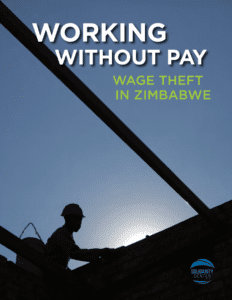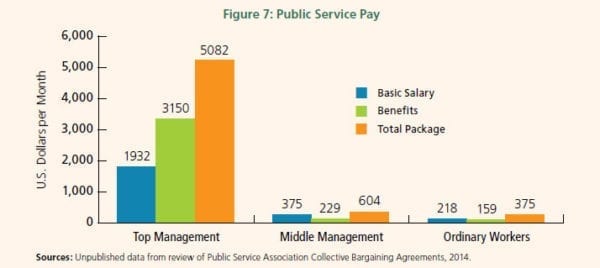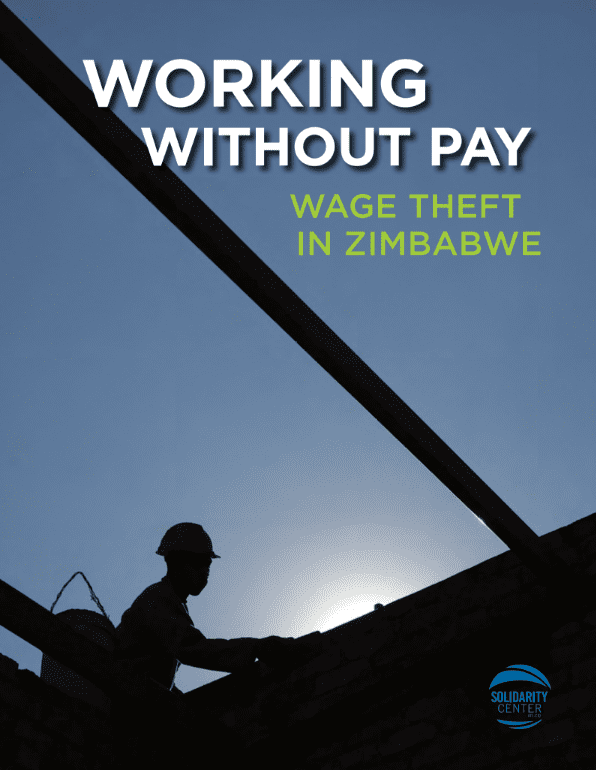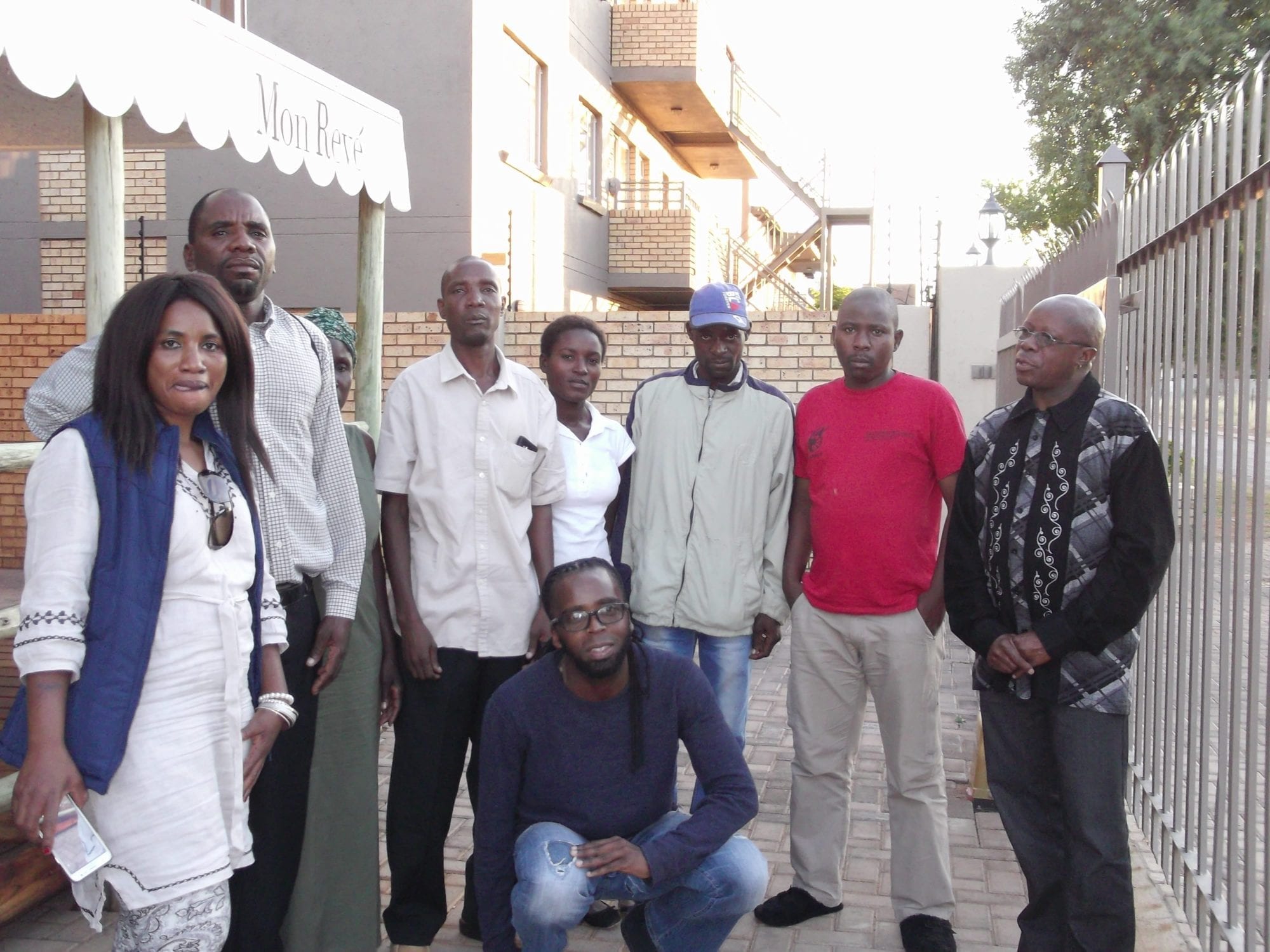
Jul 15, 2016
An astounding 80,000 Zimbabwe workers in formal employment—out of some 350,000 workers—did not receive wages and benefits on time in 2014, according to a new Solidarity Center report, “Working Without Pay: Wage Theft in Zimbabwe,” released today in Harare.
 As a result of this widespread wage theft, many workers say they are forced to eat only one or two meals a day; move repeatedly to access affordable housing; and rent two rooms or fewer for their entire family to make ends meet.
As a result of this widespread wage theft, many workers say they are forced to eat only one or two meals a day; move repeatedly to access affordable housing; and rent two rooms or fewer for their entire family to make ends meet.
Through first-person interviews and other research by affiliates of the country’s main trade union confederation, the Zimbabwe Congress of Trade Unions (ZCTU), the report provides hard data behind last week’s successful one-day shut-down of businesses, government and services by workers across Zimbabwe outraged over wage theft and a new law targeting market vendors who make up the vast proportion of the workforce.
Paid Only Enough to Get to Work
One woman interviewed in the report, whose experience is not uncommon, says she has received $26 a month in wages for the past eight months, although her monthly salary is $342. Yet basic living costs, which on average include $60 for renting a single room, $30 for electricity, $15 for water and $22 for transportation to work, mean she only has sufficient funds to get to and from her job.
“This failure to pay what workers are legally entitled to is wage theft in that it involves employers taking money that belongs to their employees and keeping it for themselves,” the report states. “This is a clear violation of international labor standards, as well as national legislation on the employment of workers.”
The report traces the ongoing wage theft to 2012, as employers in the public- and private-sector increasingly began delaying wage payments.
Up to 95% of Zimbabweans Work in Informal Economy
Simultaneously, the number of jobs in the informal economy has skyrocketed, the report points out. Some 6.3 million people made up Zimbabwe’s workforce in 2014, of which 5.9 million workers (94.5 percent) were informally employed, compared with 84.2 percent in 2011, according to “Working without Pay.” An additional 800,000 women and men were in the workforce, but unemployed.
Last month, the government introduced a statutory law that bans imports of basic commodities—a law that directly affects hundreds of thousands of informal economy workers who survive on cross-border trading. Up to 95 percent of jobs in Zimbabwe are in the informal economy, and workers say the new law takes away their livelihoods.

Based on surveys at 442 companies, and the result of extensive research by the Labor and Economic Development Research Institute of Zimbabwe, the report also documents extravagant salaries and benefits to middle and top management even as workers go unpaid and presents recommendations for action to address the problem.
Companies Involved in Wage Theft Must Be Held Accountable
Some of the recommendations include:
- The Ministry of Labor, together with representatives of employers and unions, should review the status of companies that are not paying their workers and assist in developing plans to rectify the injustice.
- Unions representing workers in companies not paying salaries—in full and on time—should demand that the government bring criminal proceedings under the relevant provisions of the Labor Act against employers.
- Trade unions should advocate for payment of interest on late payment.
- The government should set an example by reviewing the wage structure in government agencies and quasi-government agencies to limit benefits to top managers, institute a more just pay scale and prioritize payments to workers through collective bargaining or social dialogue.

Jul 14, 2016
Wage theft is widespread throughout the the public- and private-sectors, with Zimbabweans working months without a paycheck. Based on surveys at 442 companies, the report documents the vast scope of wage theft; outlines the responsibilities of the state under international standards and national legislation; documents extravagant salaries and benefits to middle and top management even as workers go unpaid; and presents recommendations for action to address the problem.
Download here.

May 18, 2016
Some of the 245 Zimbabwe migrant farm workers brutalized and evicted last September from a large farm in South Africa, where many had toiled for years, have now been vindicated in court.
In a recent court hearing in South Africa, a judge rejected the farm owner’s argument that the workers were on extended strike and should not be compensated or reinstated. The judge offered the workers back pay or reinstatement, and the seven workers present opted for reinstatement to the farm at the legally determined wage.
The judge indicated he could reinstate only workers who were present, and with the assistance of South African Food and Allied Workers Union (FAWU), the seven workers have begun searching for the other workers.
Zimbabwe Migrant Farm Workers Driven from Their Homes
Last August, the Zimbabwean migrant farm workers, who labored on four vegetable farms operated by Johannesburg Farm, asked for a 59-cent-per-day pay increase. The workers, who were paid $120 month, roughly half the legal minimum wage, regularly put in 12-hour days, seven days a week, and were forced to toil 17-hour days during the harvest.
In September and according to witnesses, a group of men led by the farm owner fired rubber bullets at the workers’ homes, setting some on fire to drive workers out of their houses, where they were assaulted and clubbed. One of the workers, Edias, told Solidarity Center staff that he and four other workers were then kidnapped, tortured and interrogated for hours before police arrived. (For farm workers’ safety, we are using first names only.)
Unable to look for other jobs because the farm owner had confiscated their work papers, Edias and the others traveled to a refugee camp in Lephalale, South Africa, where they arrived in December near starvation.
Criminal Case and Wage Case Pending
Two other cases are pending. One involves a criminal hearing, set for late August, on the kidnapping and torture of the farm workers. South Africa’s Labor Department is leading the second case, which focuses on the issue of wage law violations. The Labor Department has the authority to demand back wages to January 1, 2015—which total more than $100,000—and assess penalties for violating the law.
Along with FAWU and the Migrant Workers’ Union of South Africa (MIWUSA), the Solidarity Center has provided key support to the Zimbabwe migrant workers, enabling them to be represented in court, offering material aid, generating public attention for their plight and raising awareness of the often brutal working conditions of migrant workers across South Africa.
The workers who are returning to the farm say they will post the ruling on minimum wages for farm workers and tell Solidarity Center staff that they feel vindicated—like human beings with standing and rights, according to one worker.

Jan 6, 2016
Whether building a towering office building in downtown Zimbabwe, sewing garments in a Bangladesh factory or digging for phosphate in Mexico mines, the world’s unsung working people demonstrate, time and again, the dignity of work. Here, we celebrate some of the amazing women and men we partnered with in 2015, and showcase their efforts to improve their lives and livelihoods and tip the scales toward greater equality in their countries.
As Mervat Jumhawi, a former garment worker and union organizer working with the Solidarity Center in Jordan, described her own experience: “When I became member of the union, I became stronger.”
[portfolio_slideshow id=6893]
Aug 12, 2015
Police entered trade union offices today and, following earlier arrests blocking street protests, are creating a climate of intimidation limiting public challenge to a recent court ruling causing thousands of workers to lose their jobs, with more job losses expected.
“The mass retrenchments emanating from the Supreme Court ruling of July [17], 2015, will exacerbate an already difficult position for the working people of Zimbabwe,” says Godfrey Kanyenze, director of the Labor and Economic Development Research Institute of Zimbabwe (LEDRIZ), a Harare-based economic think tank.
Several truckloads of riot police entered offices of the country’s main trade union confederation, the Zimbabwe Congress of Trade Unions (ZCTU), this morning in Harare, continuing a campaign of intimidation against workers protesting mass job losses.
Overwhelming police presence, and brief detention of protest organizers in Harare, prevented marches scheduled to take place across the country on Saturday. Riot police entered ZCTU offices, dispersing a crowd of protesters gathered there and detaining ZCTU Secretary General Japhet Moyo and President George Nkiwane, along with a handful of other trade union leaders preparing to lead the protests.
A ruling handed down by the Zimbabwe Supreme Court last month prompted the popular protests, organized by Zimbabwe’s largest labor federation, the Zimbabwe Congress of Trade Unions (ZCTU).
The ruling makes it legal for all employers to terminate workers’ contracts at any time, without offering them layoff benefits, by giving them three months’ notice. Up to 18,000 people have already lost their jobs, and more job losses are expected.
“This ruling marks the last nail on formal employment,” says Kanyenze.
In recent years there has been a dramatic shift in Zimbabwe of workers from the formal to the informal sector—where jobs are comparatively precarious, low-paid and without social protection.
Almost 95 percent of the estimated 6.3 million people in Zimbabwe’s workforce were defined as employed in the informal economy, according to a 2014 government report. And, in the three years to 2014, informal-sector employment grew by 29 percent, from 4.6 million people to 5.9 million.

 As a result of this widespread wage theft, many workers say they are forced to eat only one or two meals a day; move repeatedly to access affordable housing; and rent two rooms or fewer for their entire family to make ends meet.
As a result of this widespread wage theft, many workers say they are forced to eat only one or two meals a day; move repeatedly to access affordable housing; and rent two rooms or fewer for their entire family to make ends meet.



